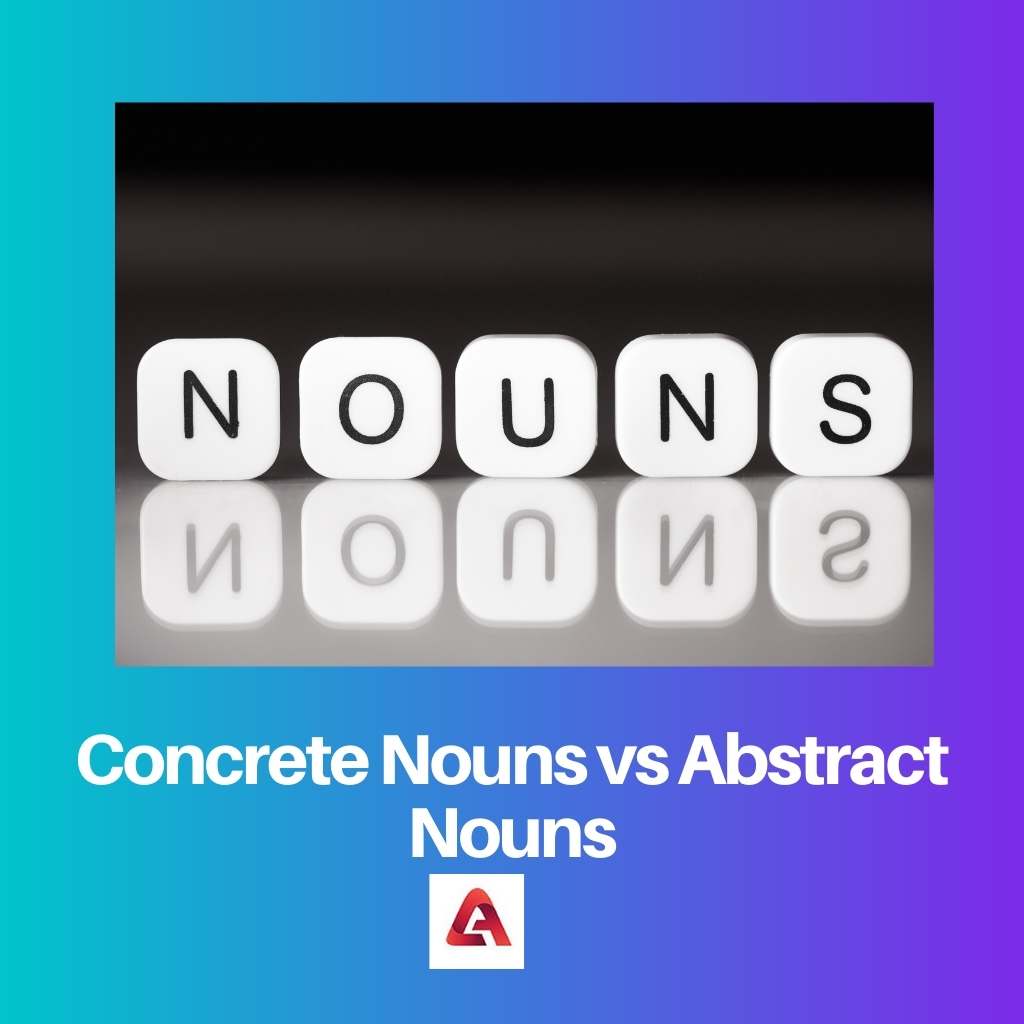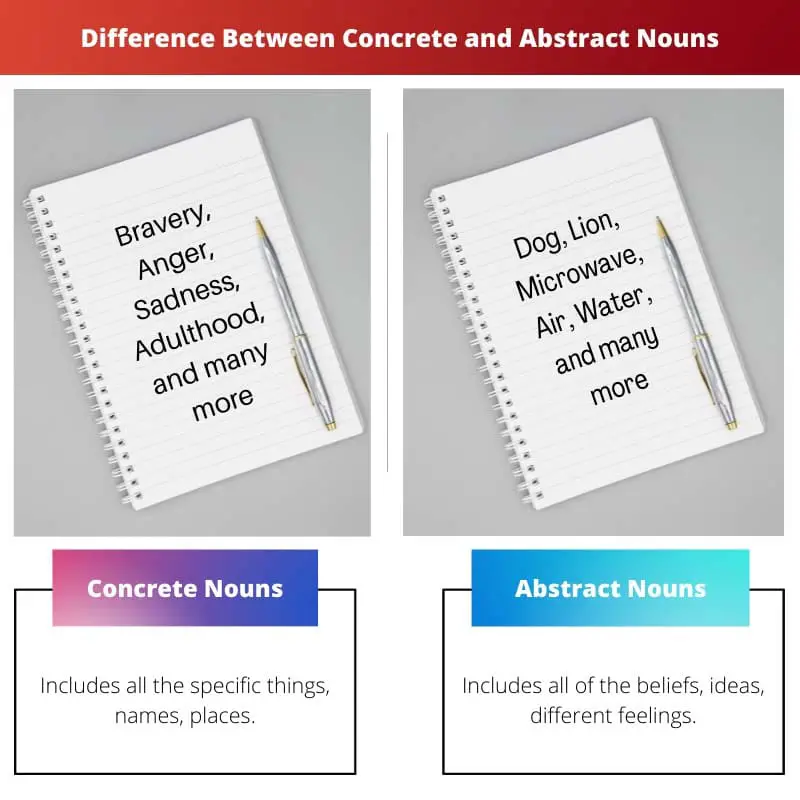Nouns are one of the important parts that are required to form a complete sentence or statement. It is stated as to be telling about a specific place, time, name, or thing.
And can be further subdivided into many types depending on nature. The different nouns are – Collective Nouns, Common Nouns, Proper Nouns, Concrete Nouns, Countable Nouns (Count Nouns), Uncountable Nouns (Mass Nouns), and Abstract Nouns.
The whole subtypes of nouns have different definitions and examples for them.
Key Takeaways
- Concrete nouns represent tangible objects, while abstract nouns denote intangible concepts.
- Concrete nouns can be perceived through the senses, unlike abstract nouns.
- Abstract nouns express emotions, ideas, or qualities.
Concrete Nouns vs Abstract Nouns
The difference between Concrete Nouns and Abstract Nouns is that Concrete Nouns are the ones that signify specific people or things (including – those that can be felt, touched, smelled, tasted, watched, and heard). In other words, they include all the items that consist of all the things with five senses. Whereas comparatively, on the other hand, Abstract Nouns are the ones that tell us about things that focus on beliefs, ideas, conditions, and feelings. They all are things that cannot be felt with the five senses.

Concrete Nouns are the ones referring to the items or things that can be felt physically. The division includes the things that can be mentioned by a specific name or place or things, also the things that can be experienced or observed by an individual, like – smelled, touched, seen, heard, and tasted.
Some examples of the same are – beach, tune, cat, dog, etc.
Abstract Nouns are the ones referring to items or things that cannot be felt physically. The division includes all of the items that are felt and observed, the feelings, ideas going in mind, and certain beliefs that are followed, and all can be put within this category.
Some good examples of the same are – time, love, sadness, friendship, truth, etc.
Comparison Table
| Parameters of Comparison | Concrete Nouns | Abstract Nouns |
|---|---|---|
| Definition | Includes all the specific things, names, places | Includes all of the beliefs, ideas, different feelings |
| Tangibility | Yes | No |
| Five Senses | It can be anticipated through it | It cannot be anticipated through it |
| Compatibility | With proper, common, countable, uncountable, and collective nouns | With uncountable and common nouns |
| Examples | Bravery, Anger, Sadness, Adulthood, and many more | Dog, Lion, Microwave, Air, Water, and many more |
What are Concrete Nouns?
Concrete Nouns are nouns that mention specific places, things, or people. These nouns include all the things that can be anticipated through the five senses: observe, taste, smell, hear, and touch.
Thus, these are said to be easier to distinguish among the other fellow types of nouns.
According to its definition, concrete nouns also include fictional characters, places, people, or things that are popular and known. For example – Cinderella, Godzilla, Wakanda, Iron Man, and many others.
These nouns are highly accountable as tangible. They are also compatible with various other fellow types of nouns are – proper, common, countable, uncountable, and collective nouns.
Some of the great examples include – Men, Women, Tables, Trees, Flowers, Friends, and many more.
What are Abstract Nouns?
Abstract Nouns are nouns that are known for expressing individual emotions, states of mind, beliefs, qualities, concepts, ideas, events, etc. These nouns do not include the things related to the five senses experienced or felt by a person – smell, observe, touch, hear, and taste.
They are hence quite difficult for a person to distinguish between them.
In other words, it includes things not known as physical objects. Because beside locating unphysical things, they focus on the individual’s feelings, emotions, beliefs, etc.
Also, that is why they are characterized as intangible nouns.
The compatibility of abstract nouns is unlikely with concrete nouns as they are only compatible with uncountable nouns and common nouns. Some of the examples include – Anxiety, Pain, Peace, Openness, Happiness, Joy, Beauty, Patience, Charity, Opportunity, Curiosity, Sacrifice, Life, Past, and many more.
Main Differences Between Concrete and Abstract Nouns
- Concrete Nouns are the one that is categorized and includes all the specific things, names, and places, whereas comparatively, on the other hand, Abstract Nouns are nouns that include all the things related to the idea, beliefs, and various feelings.
- Concrete nouns are the nouns known as tangible, whereas comparatively, on the other hand, Abstract nouns are the nouns known as intangible.
- Concrete nouns include all the things that contain five senses – seen, touch, taste, hearing, and smell, whereas comparatively, on the other hand, Abstract nouns are the nouns that do not include things related to the five senses.
- The Concrete nouns are compatible with many other nouns of the category that are – proper nouns, common nouns, countable nouns, uncountable nouns, and collective nouns, whereas comparatively, on the other hand, the Abstract nouns are compatible with uncountable nouns and common nouns.
- Some examples of Concrete nouns are – Santa Claus, Lord Rama, men, women, water, electron, brain, elbow, and many more other, whereas comparatively, on the other hand, some examples of Abstract nouns are – Fear, Hate, Courage, Democracy, Adventure, and many more others.

References
- https://www.cambridge.org/core/journals/journal-of-child-language/article/abs/development-of-noun-definitions-a-metalinguistic-analysis/4A3461FF9BE8FA8CDE5532505C2E7E73
- https://brill.com/view/book/edcoll/9789004264953/B9789004264953_005.xml
- https://www.frontiersin.org/articles/10.3389/fpsyg.2011.00227/full
- https://essuir.sumdu.edu.ua/handle/123456789/46244
Last Updated : 13 July, 2023


Emma Smith holds an MA degree in English from Irvine Valley College. She has been a Journalist since 2002, writing articles on the English language, Sports, and Law. Read more about me on her bio page.

I appreciate the clear and concise comparison between concrete and abstract nouns. This article is highly informative and would be particularly beneficial for English language learners.
This article is incredibly comprehensive and well-structured. The authors are thorough in their explanations, making it easier for readers to understand the nuances of concrete and abstract nouns.
I wholeheartedly agree. The inclusion of examples enhances the clarity and depth of the content.
The comprehensive nature of this article makes it an indispensable source of information on concrete and abstract nouns. It is a well-researched and highly informative piece.
This article gives a very detailed explanation of the difference between concrete and abstract nouns. It’s an excellent resource for people looking to broaden their understanding of grammar and English language.
The detailed explanation of concrete and abstract nouns is commendable. The article is well-organized and provides a thorough understanding of these grammatical concepts.
The comparison of concrete and abstract nouns is elucidating. The article effectively highlights their distinctions.
I found the information about abstract nouns particularly interesting. The article presents these ideas with clarity and precision.
The concept of concrete and abstract nouns is explained in a very detailed and engaging manner. The article is a valuable resource for individuals interested in language and grammar concepts.
The inclusion of a comparison table further facilitates readers’ understanding of the differences between concrete and abstract nouns.
The article provides a comprehensive overview of concrete and abstract nouns and their differences. The examples provided make it easier for readers to grasp the concept.
This article provides an insightful analysis of concrete and abstract nouns, catering to a broad audience with varying levels of expertise in grammar and linguistics.
I absolutely agree. The depth of the content makes it a valuable resource for anyone interested in language study.